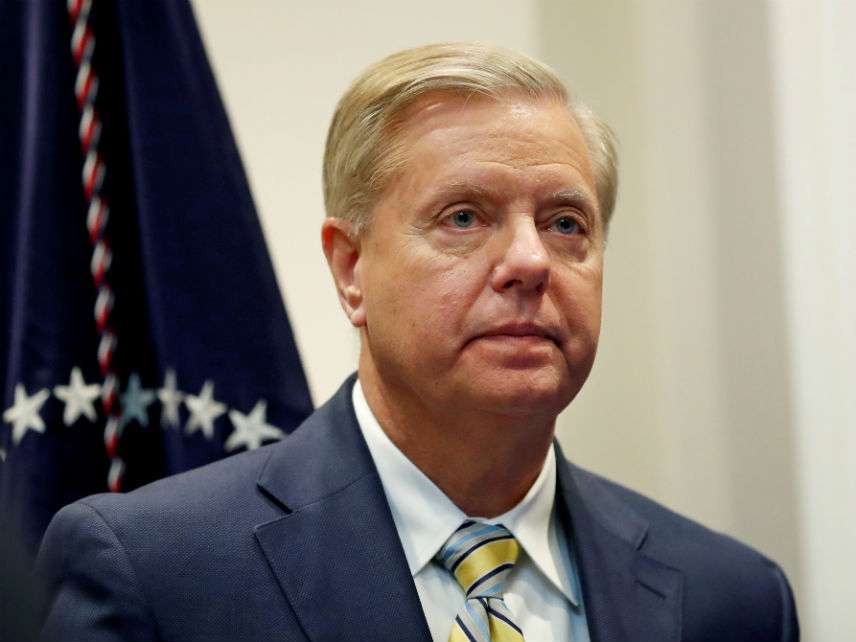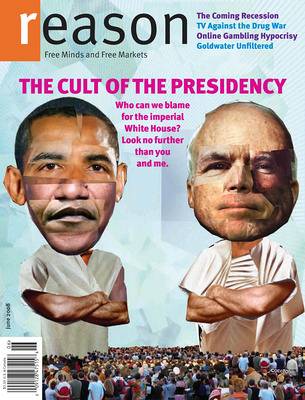Trump's National Emergency Is an American Obscenity
Republicans embrace presidential authoritarianism, continuing a foul bipartisan tradition of legislating immigration through the executive branch.

When then-president Barack Obama attempted in November 2014 to expand the Deferred Action for Childhood Arrivals program to protect an additional 3.7 million illegal immigrants from deportation, Sen. Lindsey Graham (R–S.C.), a longtime supporter of comprehensive immigration reform, opposed the move. Indeed, he signed onto an amicus brief challenging the executive order at the Supreme Court.
"What is at stake in this matter is nothing less than an effort to supplant Congress's constitutional power," the brief read. "There is little doubt that the Executive adopted the Deferred Action for Parents of Americans and Lawful Permanent Residents ('DAPA') program as part of an explicit effort to circumvent the legislative process."
Graham, who has since graduated to the chairmanship of the Senate Judiciary Committee, was right then. He's a disgrace now.
Mr. President, the Democrats are not working in good faith with you.
Declare emergency, build the wall now.
— Lindsey Graham (@LindseyGrahamSC) January 11, 2019
President Donald Trump, according to the latest reporting, is "laying the groundwork for a declaration of national emergency to build [a] border wall," telling his phone buddy Sean Hannity last night: "Now if we don't make a deal with Congress, most likely I will do that….I would actually say I would. I can't imagine any reason why not because I'm allowed to do it. The law is 100 percent on my side."
Needless to say, people with more familiarity with law don't share the president's view. "The validity of this claim is dubious at best," Ilya Somin explains at The Volokh Conspiracy. "It's a terrible idea," editorializes National Review. "Even if it's legal—which is unclear, at best—it would represent another unwelcome step in America's long march toward unilateral government by the executive." Opines NR's David French: "If you look at the plain language and clear intent of the relevant statutes, they do not permit Trump to defy Congress and build his wall. He knows it. Congress knows it. His own lawyers know it."
The congressional Republican most vocally opposed to the national-emergency scheme is, unsurprisingly, the self-described libertarian Rep. Justin Amash (R–Mich.). "I think it would be a huge mistake," Amash told Michigan Advance yesterday, "and it would be a massive executive overreach….There's no national emergency. Obviously, there are problems at the border, but to declare a national emergency—and assume all sorts of powers—would be way beyond what I think is authorized."
But Amash's is a lonely view even within his own Freedom Caucus bloc of ostensible constitutionalists. "I would prefer the legislative option," Freedom Caucus Rep. Scott Perry (R–Pa.) tells The Huffington Post. "But if he keeps on trying and trying and trying, and the other side is so intractable that they refuse to discuss it, what other option do you have?"
This foul immigration cycle—legislative impasse, presidential policymaking, legal challenges, all lubricated by grotesque partisan hypocrisy—long predates Trump. Both Obama and George W. Bush, like the 45th president, deployed National Guard troops to the U.S.–Mexico border as political theater to influence legislation. Both consciously increased deportations as a reaction to Congress—Obama to demonstrate his seriousness about border security as a negotiating precursor, Bush to teach senators what the "consequences" would be for its inaction.

You can have sympathy for the desired ends of a policy while still opposing the unsound means. That's one of the core principles animating America's founding documents—redirecting government is supposed to be hard, not easy, requiring arduous navigation of co-equal branches and the protection of individual rights. Overriding congressional intent is supposed to come through the veto power, not situational emergency declarations.
Yes, presidents have wide latitude to prioritize law enforcement resources, declare national emergencies, and invoke "national security." And yes, Congress has serially and consciously abdicated even the most basic of its constitutionally mandated functions. The presidency gets more imperial by the day.
But the proper response to this pathology is not to shrug and say "what other option do you have," but rather to rally against America's creeping re-monarchization. As Mel Brooks taught us, it's good to be the king—but it's not so hot to be the king's subject. In a polarized country where only three of the past seven presidential winners received a majority of the popular vote, ceding new powers to the White House is a recipe for heightened social conflict. Particularly when the new power involves the deliberate trampling of property rights.
The forthcoming Elizabeth Warren administration would no doubt enjoy the power to re-write corporate charters, create a government-run pharmaceuticals industry, and spend a half-trillion dollars on public housing. But the Constitution requires that those who agree with such proposals convince enough legislators to get them passed, while not running afoul of the Bill of Rights. That is how the system was designed.
Congressional Republicans who endorse the declaration of an emergency that isn't an emergency, who support using presidential action and threats thereof as a backstop to legislative negotiations, might as well turn in their security passes. What is the point of a legislative branch that won't legislate? If we are to halt the long slide into one-man governance, politicians will have to adopt more than a situational constitutionalism—and voters will have to reject with prejudice those who'd rather kiss the president's ring than do their damn jobs.


Show Comments (326)